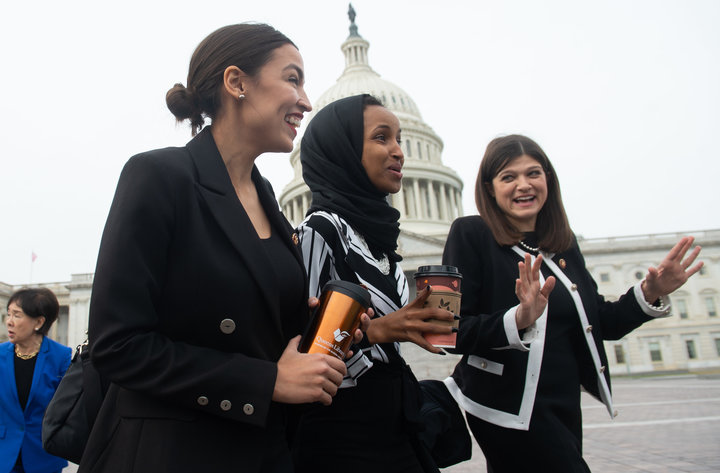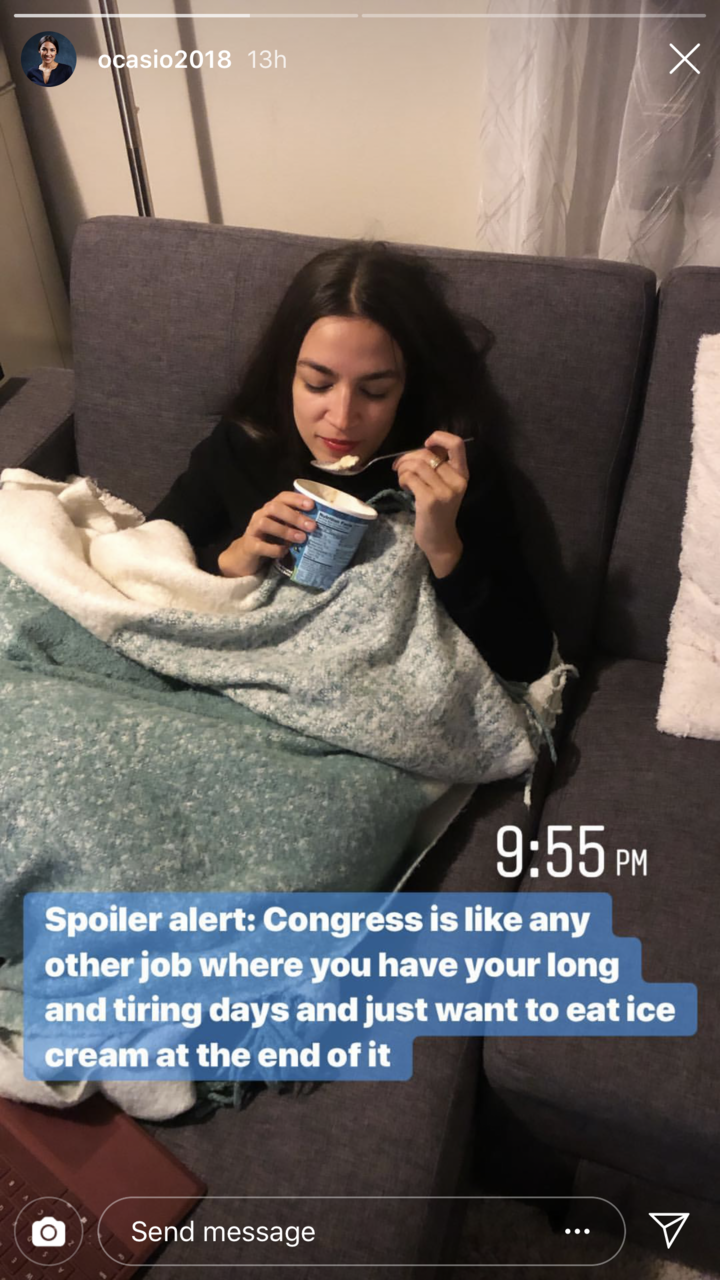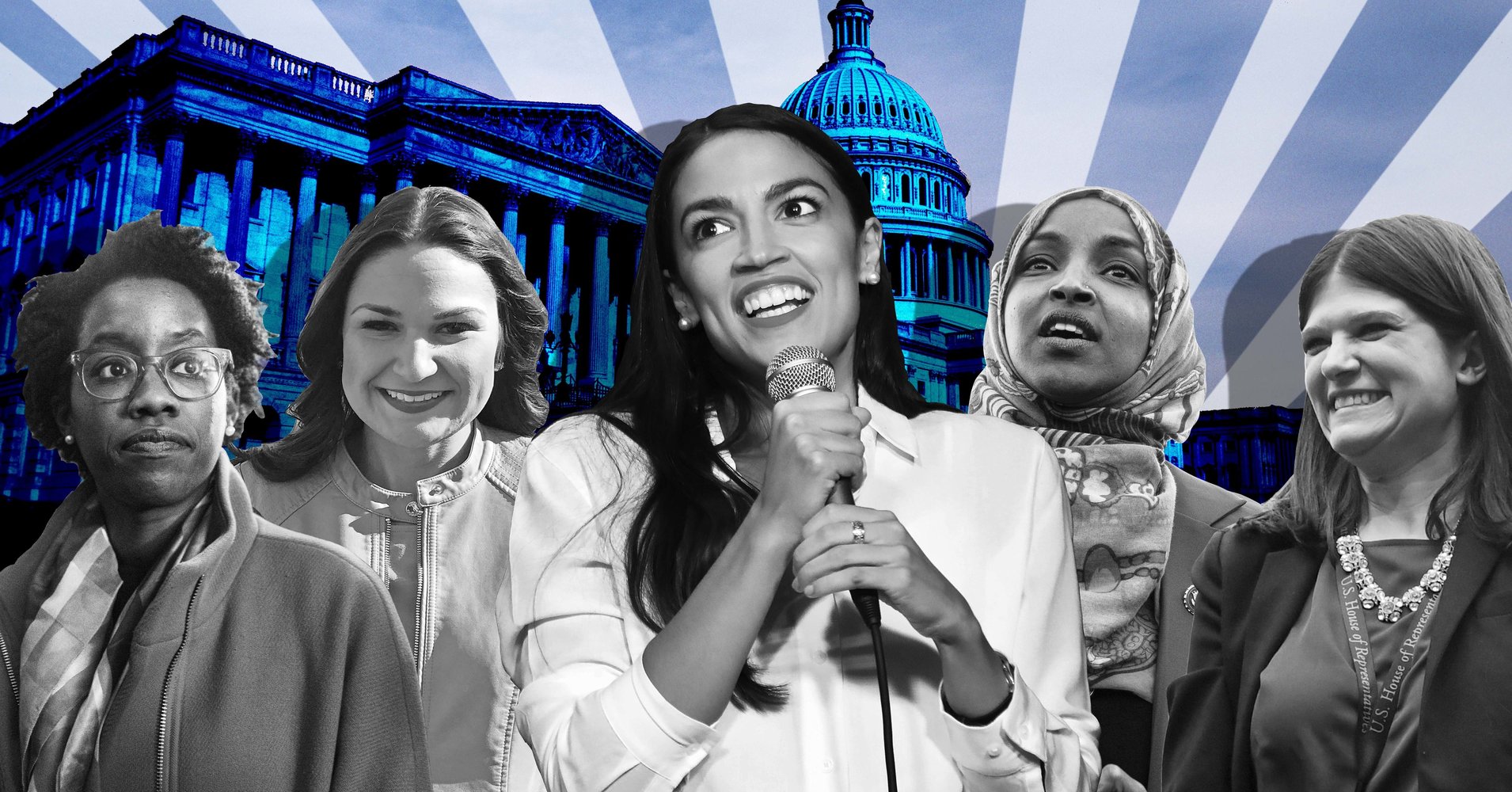[ad_1]
On Jan. 3, 31-year-old Katie Hill posted a tweet about her first day at a new job. “Sometimes in the middle of an unreal day, you just really need to hug your mom,” she wrote, the text paired with a cute photo of her hugging an older woman bearing a striking resemblance to her.
It felt like a typically millennial type of milestone post. Except that Hill’s new job was congresswoman for California’s 25th District, and when she was hugging her mom, she was surrounded by TV cameras arranged to document her swearing-in ceremony.
Hill is my age. In fact, we were born just three weeks apart, both late summer babies. We grew up thousands of miles apart, but in many ways, I see myself in her. We both make jokes about our respective “resting bitch faces” and take photos in snowstorms. I know this because she posts those photos on Instagram.
Hill is, unquestionably, my peer. So is Alexandria Ocasio-Cortez (29, D-N.Y.), Max Rose (31, D-N.Y.), Haley Stevens (35, D-Mich.), Lauren Underwood (32, D-Ill.), Abby Finkenauer (30, D-Iowa), Ilhan Omar (37, D-Minn.) … and 14 other freshman members of Congress, comprising one of the most diverse classes in United States history.
At the start of the 115th Congress in January 2017, there were just five millennials (individuals born between 1981 and 1996) in the House of Representatives. But as of January 2018, when the 116th Congress convened, there are 26. According to Pew, more than one-fifth of the 91 congressional freshmen are millennials, and two-thirds (14) of those representatives are Democrats.
For the first time, the millennial generation ― my generation ― is represented in Congress in numbers that really matter. And for the first time, the millennial generation can see those numbers in action. We can watch Stevens enter her office for the first time. We can witness Omar beam with pride as she gets sworn in with her hand on the Quran. We can follow along as Ocasio-Cortez and Hill and Underwood try to track down Mitch McConnell to confront him about the government shutdown. (#WheresMitch.)
Because here to combat Donald Trump’s clapback presidency, defined by one-sided exultations and blocked accounts on Twitter, is a cohort of freshmen congresspeople who are naturally inclined to view social media as a public forum.
Predictably, there has been a swift backlash to these (diverse, mostly female) newly minted, digital native politicians. The negative reaction has been especially vicious toward Ocasio-Cortez, who, as a progressive young woman of color, would have stood out in Congress even without her dynamic social media presence, but seems to be perceived as a threat to both the establishment of her own party and sexist obsessives outside of it.
“She needs to decide: Does she want to be an effective legislator or just continue being a Twitter star?” one House Democrat told Politico last week, suggesting that those two things must be mutually exclusive, as though a fiery Twitter presence must be indicative of a purely self-serving desire for fame rather than a genuine desire to communicate with the public.
This is a perception that Stevens takes issue with. “I think we should be celebrating the way that this freshman class is using social media to bring a new level of transparency and access to our government,” she told me. “That’s a great thing!”
The arrival of these social media-savvy millennial congresspeople is thrilling to watch on another level; an indication that people my age are growing up to become the power brokers and thought leaders that a wider culture told us we were too lazy and entitled to be.
“I have always been fascinated by politics, but up until this election, it felt like something the ‘grown-ups’ handled,” Kate Ormonde, 34, told me, explaining how the photographs that came out of swearing-in day affected her. “[There were] so many women of different backgrounds, dressed in bright colors, contrasted with white men in dark suits.”

At 22 percent of the population, millennials are poised to become the largest living generation, currently ranging in age from 23 to 38, a prime time to be entering into the ranks of power inside and outside government.
We’re also an endlessly ― and arguably, unfairly ― mocked generation. We’ve allegedly “killed” everything, from Applebee’s to beer to home ownership to diamonds. We’re too sensitive, too self-absorbed and too focused on buying avocado toast to save up for a home or focus on building stable careers. Look a bit closer, and we’re the first generation that is predicted to be financially worse off than our parents. We’re saddled with student debt. We’re perennially burned out even as we try harder and harder to optimize our lives. It’s becoming infinitely harder to prepare for retirement.
Many of the millennials I spoke to for this piece mentioned these lived experiences as a reason they were so thrilled to see a critical mass of their peers so visibly in government.
“They understand that younger people have to work harder than their parents to achieve the same quality of life,” said Aaron Huertas, 34. “They grew up with the climate crisis as textbook science. They’ve adopted more democratic forms of communication and seem friendlier to grassroots politics.”
“It’s amazing to see people have our ideals in mind, advocating for issues that impact us,” added Eva Rubinoff, 31, citing student loans and social security as things she’d hope to see prioritized.
I have always been fascinated by politics, but up until this election, it felt like something the ‘grown-ups’ handled.
Kate Ormonde, 34
Of course, these freshman congresspeople are still determining which issues to tweet about, what photos and videos to share and what stories to promote. No social media account is going to be truly unfiltered, and as a public forum, social media certainly has its clear faults. But by breaking down some of the traditional barriers that have long existed between elected leaders and their constituents, these representatives are projecting a different sense of accessibility ― one that works in these newly elected officials’ favor.
Not only are younger voters relating to them, but constituents are more able to view social media as a place of discussion rather than one-sided doomsday announcements and opaque decision-making. The expectations that the public has for its elected officials ― both online and off ― is shifting.
Stevens told HuffPost that she often uses Facebook and Twitter to direct-message with constituents, including those who vehemently disagree with her. Sometimes, she says, she even takes those conversations offline by asking for her constituent’s phone number so they can talk about the issue in a more personal way. She sees her Instagram as more of an open window; by posting informal photos and videos of her day, she hopes people can get a daily glimpse of what she’s up to behind the closed doors of Capitol Hill.
This is a sentiment that Hill echoed to CNN. “I don’t want to become more formal. That’s not on the table,” she said.
Perhaps no congressional newbie better encapsulates the shift in public discourse than Ocasio-Cortez. She has posted Instagram stories of her office, her voting card, her press-on manicure, postcards from her constituents and her dance moves. Last week, she posted a photo of herself on the couch, under a fuzzy blanket with a pint of Ben & Jerry’s ice cream. “Spoiler alert: Congress is like any other job where you have your long and tiring days and just want to eat ice cream at the end of it,” she wrote.

What a gift to see the job of a congressperson as just that ― a job, not something that is separate from most of us, not entailing decisions made in an ivory tower by wealthy white elders. It’s too early to tell what the legacy of these young politicians might be, but damn if it doesn’t feel good to watch your peers take charge of the messy country we’ve collectively inherited.
CORRECTION: A previous version of this story misidentified the state that Rep. Lauren Underwood represents. The piece has been updated to reflect that she represents Illinois.
[ad_2]
Source link

